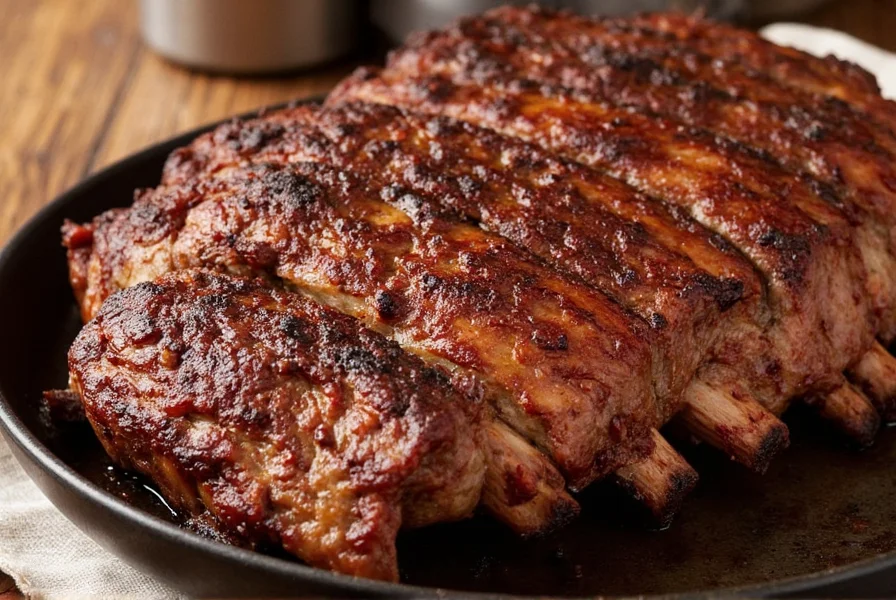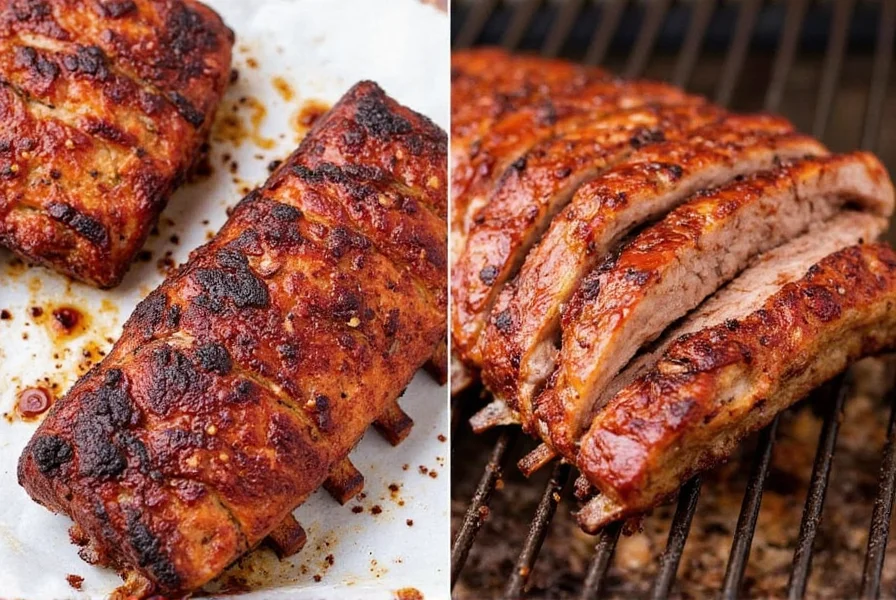Smoky Seduction: 7 Secrets to Mastering Smoked St. Louis Style Ribs Like a Pitmaster
If you've ever taken a bite of fall-off-the-bone, smoky-sweet St. Louis style ribs and thought, "How does this even taste this good?", then you're not alone. This beloved barbecue classic hails from the heartland of American grilling culture — Missouri — and has become a staple at backyard cookouts, smokehouses, and competitive BBQ circuits worldwide.
In this article, we’ll walk you through everything you need to know about these meaty masterpieces: what makes them unique, how to prep, season, and smoke them to perfection, and which products will help you achieve that iconic flavor profile. Whether you're a seasoned pitmaster or a weekend warrior, get ready to unlock the secrets behind one of America’s most mouthwatering rib styles.
Table of Contents
- What Makes St. Louis Style Rbs Unique?
- The Magic of Prep: Trimming, Removing Membrane, and Rubbing Right
- Rub Formulas: From Classic to Creative
- Smoke & Time: Finding Your Sweet Spot
- Wood You Believe It? Choosing the Right Fuel for Flavor
- Wrap or Not to Wrap? The Foil Debate
- Glaze It Up: Sauce Strategies That Shine
- Buying Guide: Must-Have Tools & Ingredients
- Conclusion: Fire Up Those Flavors
What Makes St. Louis Style Ribs Unique?
St. Louis style ribs come from the spare ribs cut, but unlike baby back ribs (which are more tender and lean), they’re meatier, fattier, and loaded with flavor. The defining characteristic? They're trimmed into a neat rectangular shape by removing the brisket bones, cartilage, and tips — giving you a consistent rack that cooks evenly and looks stunning on the plate.
| Characteristic | St. Louis Style Ribs | Baby Back Ribs |
|---|---|---|
| Origin | Spare Ribs | Back Ribs |
| Fat Content | Higher | Lower |
| Tenderness | Firm & chewy | Tender & delicate |
| Flavor | Rich & bold | Mild & subtle |
| Cooking Time | 4–6 hours | 3–5 hours |
The Magic of Prep: Trimming, Removing Membrane, and Rubbing Right
You can have the best smoker in the world, but if you skip the prep, your ribs won’t reach their full potential. Let’s break down each step:
- Trimming: Use a sharp boning knife to square off the rack by removing the uneven bone ends and excess fat. A clean rack ensures even cooking and better seasoning penetration.
- Membrane Removal: Flip the ribs bone-side up and locate the thin silverskin membrane. Gently lift it with a butter knife or paper towel grip and peel it off completely. Leaving it on can lead to a rubbery texture and prevent flavors from soaking in.
- Dry Brining: Sprinkle a light layer of coarse sea salt and let sit uncovered in the fridge for 1–2 hours. This draws out moisture and allows the rub to stick better later.
Rub Formulas: From Classic to Creative
The right rub is like the first kiss before the main event — it sets the tone. Here are a few tried-and-true blends you can try:
Classic St. Louis Rub
- 3 tbsp brown sugar
- 2 tbsp paprika
- 1 tbsp garlic powder
- 1 tbsp onion powder
- 1 tsp chili powder
- 1 tsp black pepper
- ½ tsp cayenne (optional)
Southwest Twist
- Add chipotle powder and cumin
- Replace paprika with smoked paprika
Asian-Inspired Rub
- Substitute brown sugar with palm sugar
- Add ginger powder and sesame seeds
Smoke & Time: Finding Your Sweet Spot
Low and slow is the name of the game when it comes to smoking ribs. For St. Louis style, aim for a target temperature between 225°F and 250°F (107°C–121°C). Here's a general timeline:
| Temperature | Estimated Smoke Time | Internal Temp Goal |
|---|---|---|
| 225°F | 5–6 hours | 195°F–205°F |
| 250°F | 4–5 hours | 195°F–205°F |
A digital thermometer is essential here. Don't rely solely on time — test doneness by twisting a bone. If it pulls away easily, you're there!
Wood You Believe It? Choosing the Right Fuel for Flavor
Wood choice can make or break your smoked St. Louis style ribs. Here’s a quick guide:
| Wood Type | Flavor Profile | Best For |
|---|---|---|
| Hickory | Strong, bacon-like | Traditional BBQ lovers |
| Oak | Medium-bodied, earthy | All-around favorite |
| Apple | Light, fruity, slightly sweet | Beginners or lighter profiles |
| Cherry | Smoky-sweet with a hint of fruitiness | Pairing with sweeter rubs |
| Pecan | Nutty, mild, rich | Deep, complex smoke flavor |
Wrap or Not to Wrap? The Foil Debate
Wrapping your ribs in foil (known as the “Texas Crutch”) during the stall phase can speed up cooking and tenderize the meat faster. But purists argue it reduces bark development. Here's the breakdown:
| Pros | Cons |
|---|---|
| Speeds up cooking | Softens the crust |
| Retains moisture | Less intense smoke flavor |
| Breaks down collagen faster | Can create a steamed texture |
We recommend wrapping for 1–2 hours after hitting the stall (around the 3-hour mark), especially if you’re working with a smaller window of time.
Glaze It Up: Sauce Strategies That Shine
While some say ribs shouldn’t be sauced to preserve the dry rub’s glory, others swear by the sweet and tangy finish that sauce brings. Here’s how to do it right:
- Apply at the End: Slather sauce on the last 15–30 minutes of cooking to avoid burning the sugars.
- Layer It: Apply 2–3 thin coats instead of one thick one for a richer glaze.
- Go Homemade: Try a basic ketchup-based sauce with apple cider vinegar, molasses, Worcestershire, and a dash of hot sauce for depth.
Buying Guide: Must-Have Tools & Ingredients
Whether you're new to the game or looking to upgrade your setup, here are our top picks for making killer smoked St. Louis style ribs every time.
1. Weber Smokey Mountain Cooker

- Features: 18-inch diameter, porcelain-coated steel, built-in dampers
- Advantages: Affordable, reliable, great heat retention
- Use Case: Beginners and home smokers who want consistent results
- Occasion: Weekends, gatherings, family dinners
2. MeatStick Digital Thermometer

- Features: Instant-read, waterproof probe, backlight display
- Advantages: Precise readings, fast, easy to clean
- Use Case: Monitoring internal temps without guesswork
- Occasion: Every cook, big or small
3. Kansas City Steak Seasoned Rib Rub
- Features: Pre-mixed, balanced blend of spices
- Advantages: Saves time, trusted flavor profile
- Use Case: Quick prep without measuring
- Occasion: Busy weeknights or impromptu grilling
4. Applewood Chunks – Jack Daniel’s Brand
- Features: Natural wood chunks, whiskey barrel infused
- Advantages: Adds unique smoky sweetness
- Use Case: For those seeking bold, aromatic smoke
- Occasion: Special events, dinner parties
5. Traeger Pro Series Pellet Grill

- Features: WiFi-enabled, auto-feed hopper, precise temp control
- Advantages: Hands-free cooking, perfect for multitasking
- Use Case: Serious enthusiasts or frequent smokers
- Occasion: Anytime, especially large batches
Conclusion: Fire Up Those Flavors
Smoked St. Louis style ribs are more than just a meal — they're an experience. With the right prep, rub, wood, and patience, you can turn a humble rack of ribs into a showstopper. Whether you're chasing that perfect balance of smoky, sweet, and spicy or experimenting with global flavors, there’s no wrong way to enjoy these juicy delights.
Now go grab that rack, fire up the smoker, and let the magic happen. After all, nothing says love like a plate of sticky fingers and happy faces around the table.










 浙公网安备
33010002000092号
浙公网安备
33010002000092号 浙B2-20120091-4
浙B2-20120091-4